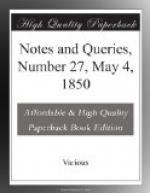“The examples are too often injudicious truncated.”
Vide also Shaw, Museum Liverianum, or rather examples given in Richardson’s Dictionary. Shaw, in speaking of the feathers of certain birds, says,
“They appear as if cut
off transversely towards their ends with
scissors. This is a mode
of termination which in the language of
natural history is called
truncated.”
The word trunck-hose is often met with.
WREDJID KOOEZ.
Queen’s Messengers.—“J.U.G.G.,” who inquires about Queen’s messengers (No. 12. p. 186.), will, I think, find some such information as he wants in a parliamentary paper about King’s messengers, printed by the House of Commons in 1845 or 1846, on the motion of Mr. Warburton. Something, I think, also occurs on the subject in the Report of the Commons’ Committee of 1844 on the Opening of Letters in the Post-office. I am unable to refer to either of these documents at present.
C.
Dissenting Ministers (No. 24. p. 383.).—The verses representing the distinctive characteristics of many ministers, by allegorical resemblance to flowers, were written by the lady whose paternal name is given by your correspondent. She married the Rev. Joseph Brooksbank. I think it quite improbable that those verses were ever published. It seems that two of the three names mentioned in your description of this “nosegay” are erroneous. The first is indisputable, RICHARD WINTER, a man of distinguished excellence, who died in 1799. “Hugh Washington” is certainly a mistake for HUGH WORTHINGTON; but for “James Jouyce” I can offer no conjecture.
J.P.S.
Ballad of “The Wars in France" (No. 20. p. 318.).—Your correspondent “NEMO” will find two versions of the ballad commencing,
“As our king lay musing on his bed,”
in appendices 20 and 21 to Sir Harris Nicolas’s History of the Battle of Agincourt, 2nd edit. They are not, I believe, in the first edition. I have a copy of the ballad myself, which I took down a few years ago, together with the quaint air to which it is sung, from the lips of an old miner in Derbyshire. My copy does not differ very much from the first of those given by Sir H. Nicolas.
C.W.G.
["J.W.” (Norwich), and “A.R.” (Kenilworth), have each kindly sent us a copy of the ballad. “F.M.” informs us that it exists as a broadside, printed and sold in Aldermary Church-yard, Bow Lane, London, under the title of “King Henry V., his Conquest of France, in Revenge for the Affront offered him by the French King, in sending him (instead of the tribute due) a ton of tennis balls.” And, lastly, the “Rev. J.R. WREFORD” has called our attention to the fact that it is printed in the collection of Ancient Poems, Ballads, and Songs of the Peasantry of England,




